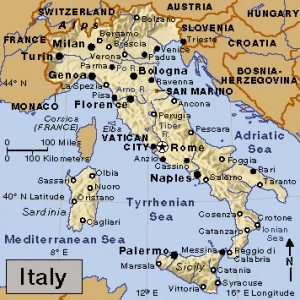Crossing the Rubicon
January 11, 2019
On Jan. 10, 49 B.C., 2,068 years ago yesterday, ancient Roman leader Julius Caesar led 5,000 troops across the Rubicon River in northern Italy. The Rubicon was part of the boundary between Roman Italy and the Roman province of Cisalpine Gaul (the Po Valley), where Caesar was governor. Caesar and other Roman governors were forbidden to cross the boundary with troops. Caesar was commanding an army in Gaul when the Roman Senate, fearing his power, ordered him to give up his command. Caesar refused and led his men across the Rubicon. This action symbolized the start of Caesar’s successful drive for the leadership of Rome. The expression to cross the Rubicon means to make a decision that cannot be changed.

On Jan. 10, 49 B.C., Julius Caesar led an army across the Rubicon River in northern Italy, an act that started a civil war in ancient Rome. To this day, if someone “crosses the Rubicon,” they have made a big decision that cannot be changed. Credit: © Shutterstock
In 60 B.C., Caesar—then an ambitious senator—allied himself with the powerful Romans Marcus Licinius Crassus and Gnaeus Pompey. Their alliance, known as the First Triumvirate, dominated Roman politics. In 59 B.C., Caesar became governor of Cisalpine Gaul, Illyricum, and Transalpine Gaul (an area that is now mainly France), provinces north of Italy. In 58 B.C., he began a lengthy campaign to subdue powerful Gallic rebellions. During Caesar’s time in Gaul, the triumvirate in Rome began to deteriorate. Crassus died in 53 B.C., and Pompey grew steadily more suspicious of Caesar’s desire for more power. By 52 B.C., Pompey and Caesar’s enemies in the senate were plotting against him.

Click to view larger image
Before Julius Caesar crossed the Rubicon in 49 B.C., he was governor of the vast Roman province of Gaul. The Rubicon River was part of a border that separated Cisalpine Gaul from Roman Italy. Credit: WORLD BOOK map
In 49 B.C., some senators ordered Caesar to give up his army. Caesar had no intention of surrendering his army and instead led them across the Rubicon. After this hostile act, there was no turning back. Caesar had provoked, or been provoked into, a civil war. As Caesar hurried south, he met little opposition. Pompey’s troops surrendered and Pompey fled Italy.

Click to view larger image
In Caesar’s day, the Rubicon River ran near the modern city of Ravenna in northern Italy. Credit: WORLD BOOK map
Within 60 days, Caesar was master of Rome and had himself appointed dictator. But it took him nearly five years to complete the conquest of Pompey and his followers. In 44 B.C., Caesar was made dictator for life and given honors normally given only to gods. Senators and others who feared his power had Caesar murdered on March 15 (the Ides of March), 44 B.C.
The name Rubicon comes from the Latin word rubeus meaning red. The stream got its name because its waters are colored red by mud deposits.


